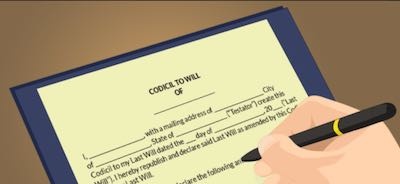What is a Codicil to a Will in New York City

A codicil is a supplement to a will, either adding to, taking from or altering its provisions, but not totally revoking such will. This is defined by Under New York Estates, Powers & Trusts Law (EPTL) § 1-2.1. Simply stated, it’s an addendum or a modification to a will. However, in order to be valid, the codicil must be executed with the same formalities as a will.
Because the codicil needs to be executed with the same formalities as a will, one begins to wonder (for good reason), why not execute a new will instead of a codicil? It’s practically the same amount of time and effort.
Codicils are an outdated way of amending a will. Before the existence of a computer, most wills were entirely handwritten or typewritten. Sometimes, handwritten wills were long. For this reason, executing a codicil to modify a few provisions of a long, entirely handwritten will made sense. Nowadays, modifying a will is as simple as making a few revisions in a document and printing it.
One of the main problems that can arise in the execution of a codicil is the need to admit both the will and codicil for probate. There are times when a will is admitted for probate but the codicil is not. If the codicil were simply a new, amended will, one only needs to present the new will for probate.
Another problem lies in the interpretation of the revocation of a codicil. A testator might construe his revocation of a codicil as giving life again to the revoked provisions of his will. However, New York courts have declared that the revocation of a codicil does not restore the revoked provisions in the will. It produces the effect of the testator dying intestate or passing such property to the residuary estate with regard to the property that was bequeathed in the revoked provision of the will. In Re: Estate of Julia Schild, 72 Misc.2d 225 (1972). For example, if the sixth provision of the will says, I give A $1000, and the codicil says, the sixth provision of my will is amended to give A $2000, if the codicil is subsequently revoked, the sixth provision in the will is not revived. The $1000 given to A in the original will shall pass to the person who inherited the residuary estate. If the original will did not give anything to A and the codicil gave A $1000, the revocation of the codicil does not revoke the $1000 taken away from the residuary estate. For this reason, the additional $1000 given in the codicil shall pass under the rules of intestacy. In Re: Estate of Lea Lake, 148 Misc.2d 569 (1990).
A codicil is the legal term for an addition or change made to a will after the will’s initial execution. Codicils are allowed in New York, yet it is unusual that you will find an attorney that will suggest that you actually use one. In fact, some New York estate attorneys would advise against using a codicil for any reason.
Codicils really go back to a time before computers when changing a will, especially one that was very long was extremely difficult. Now, your lawyer would likely have saved a copy of the original file in some sort of electronic form, meaning that making a change would be a lot simpler. During that time, your New York estate attorney can help you decide if there are any other changes you wish to make or if you want to adjust your estate plan in any way. Because of this, it is really for the best that you write a new will.
When you write a codicil, you are running into issues about whether or not the laws have changed in a way that will make whatever change you are making unviable. Codicils can open up your will to being the subject of litigation between your heirs, especially if changes are done in any handwritten way. It could create questions about what your intent was at the time the codicil was executed.
There is one limited exception where a codicil may make sense. When you destroy a will, your estate does not go back to how things were in your old will. Instead, your estate would be treated as an intestate estate. If, for some reason, there was an emergency and you needed to invalidate a new will and go back to the old one, a codicil might be an option in such a situation. However, a codicil cannot invalidate a will, simply put it back in good standing. It would be strongly advised that this only be used until the client can meet with his or her attorney and come up with a brand new will. This, admittedly, is a highly unusual situation.
To avoid problems like these, in case one likes to amend a will, it is recommended to execute a new will rather than a codicil. Should you need to write or amend a will, we, at the Law Offices of Albert Goodwin, are here for you. We have offices in New York City, Brooklyn, NY and Queens, NY. You can call us at 212-233-1233 or send us an email at [email protected].













